


Keywords: book; Luciano Lukšić;
Review of book "Hrvatska politička pedagogija" by Luciano Lukšić.
More...Keywords: peace; philosophy of peace; freedom; justice; human being
Discussion on ontological-axiological prerogatives of philosophy of peace keeps in its focus a question of what peace really means and whether it exists in human life at all? Basically, it is a try for establishing referential system of values with double purpose: first, with an aim to compare existing situation with such a reference; and second, to set proper orientation sign if we are to choose following it. Historical view on concept of peace serves the purpose of identifying whole spectrum of values where each and every of them create their own relationship towards peace. Those values are sometimes peace precondition; sometimes they are subordinate to it, whereas sometimes they all co-exist on their way of reaching the level of human being. Yet, it is to be concluded that peace and its inherent values are in continuous, dialectical relationship thus requesting tight amalgamate of theory and practice on the way of making it happen.
More...
Keywords: Franchising; Economic aspect; Commercial aspect
The text explains the right that stems from the franchise as a legal body that develops from franchising agreements. The contract includes the right to use someone else's business identity, meaning the name, trademark, symbol, products or services. In this way, the franchiser and the franchisee gain certain benefits. The article discusses the legal and economic aspect of a franchise agreement, its content, the parties, the positive and negative aspects of this agreement by the parties. Franchise agreement is a means of legal technique that fits the needs posed by imposing daily life and social practice, and in the function of protecting the security of legal transactions. Centennial practice shows that it is time that the law regulates this agreement and to be released from the status unnamed contract.
More...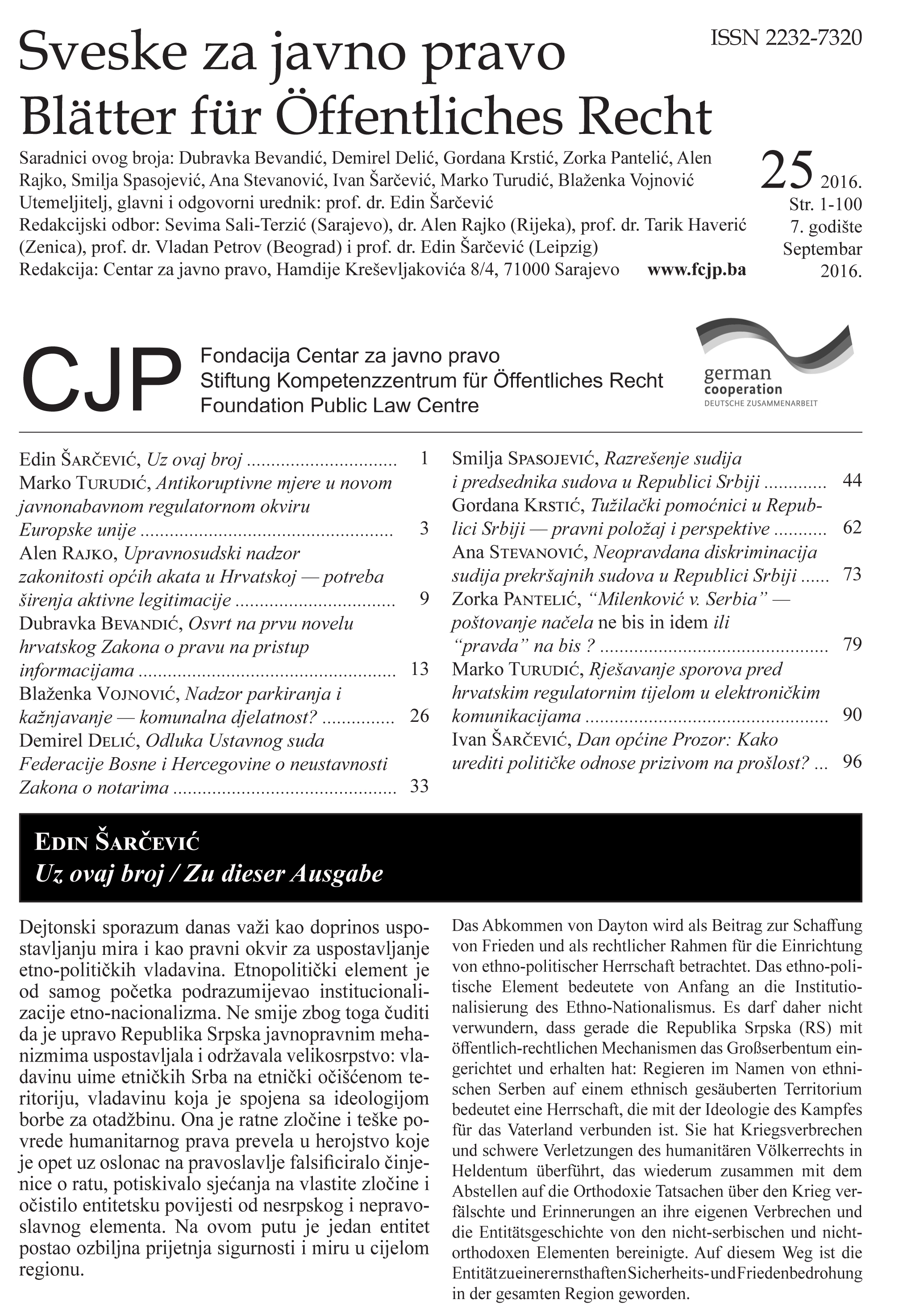
Keywords: Law; Work of Judges;Evaluation;
Postupcima javne nabave alocira se značajan dio sred stava svake države. Proračunskom potrošnjom kroz postupke javne nabave država ima priliku, izravno i neizravno, svrhovito utjecati na rast BDPa. Tako po stoje procjene da javne nabave čine oko 19 % BDPa Europske unije (EU), dok je u Republici Hrvatskoj taj postotak nešto niži i čini oko 12 % BDPa 1. Upravo zbog tolike alokacije javnih resursa, postupci javne na bave su iznimno osjetljivi na koruptivne djelatnosti, što čini snažan pravni antikoruptivni okvir ključnim za njihovo učinkovito i zakonito korištenje. Korupcija u postupcima javne nabave ima višestruke negativne učinke. Prije svega, iznimno negativno utječe na učinkovitu i racionalnu javnu potrošnju. Također, kroz dodjeljivanje javnonabavnih ugovora korumpiranim po nuditeljima, održavaju se na tržištu ponuditelji koji nisu u stanju sudjelovati u tržišnoj utakmici na temelju vlastite konkurentnosti, te to dovodi do značajnog na rušavanja tržišnog natjecanja i općenitog gospodarskog rasta zemlje.
More...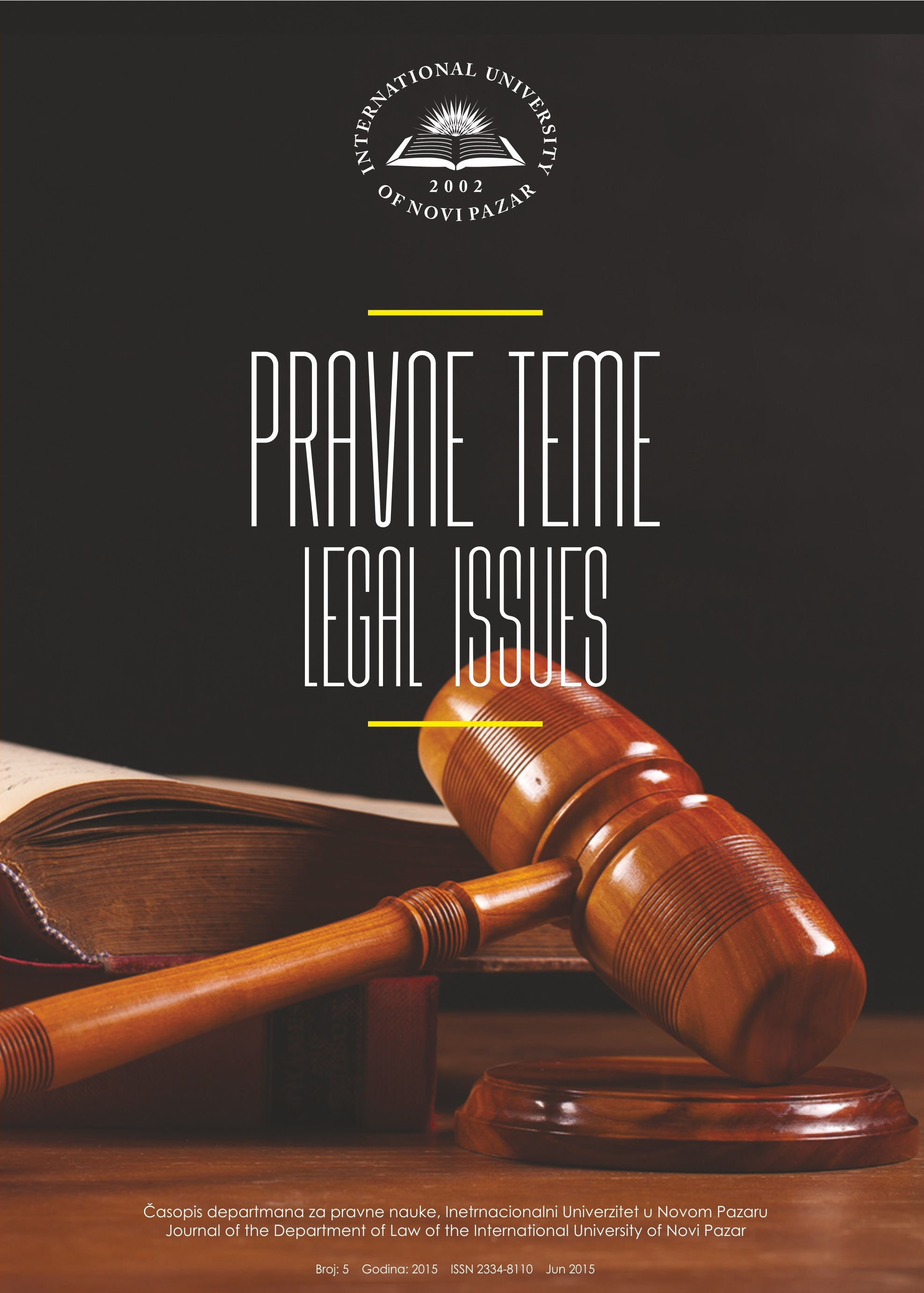
Keywords: civil procedures; judgment preamble; disposition of judgment; statement of reasons
A judgment is a court decision by which it is judged authoritatively, finally and on the merits on the application for judgment, and by which a dispute is resolved. A judgment is a very important legal document that sublimates the whole procedure; it is a logical completion that clearly, unequivocally and without doubt presents and defends the conclusions the judge comes to by evaluation of the evidence. Unless what is written in the judgment is adequate or worthy of what is previously done, the entire work up until the judgment remains valueless. Being the crown of the whole process, a verdict must be of high quality, clearly, precisely and logically presenting conclusions reached by the court after an extensive procedure. It is not enough that the judgment is legally correct – it should be linguistically and grammatically correct, easily readable and understandable. What is said in the court and how it is said is as important as what is decided. For a high quality judgment it is necessary to combine writing skills and legal knowledge.In this paper, the author analyzes constituent parts of a court decision in a civil procedure, pointing out to methodology behind its drafting, some of the most common errors, as well as particularities and rules of legalistic style as imperatives when writing the judgment.
More...Keywords: European Communities; international law; three columns; European Union;
This paper deals with European Union structure which is very complex and has implications on the position and effects of the international law rules within the scope of three European Union columns. European Union is a specific entity, unique in the international law. European Communities derive from the international law. They were established by the international treaties negotiated in accordance to the international law rules. Nevertheless, during their existence, the European Communities built their own legal system which is independent from the international law. In contrast to the European Communities, which built uniform legal system with supranational characteristics, the other two European Union columns: Common Foreign and Security Policy and Police and Judicial Cooperation in Criminal Matters, are still limited to the intergovernmental cooperation.
More...Keywords: Preliminary Agreements; Agreement to Negotiate; Partial Agreement; Agreement on Form;
The conclusion of a contract is the ultimate goal to which the negotiating parties aspire. As opposed to the ultimate contract, preliminary agreements are concluded in the course of negotiations. The ultimate contract defines the final form of the rights and obligations of the contracting parties. Where it concerns preliminary agreements, the assent of the parties does not encompass everything that is necessary for the existence of the contract. Hence, the preliminary agreements imply the fact that the process of negotiating is not finished and that the parties still have to reach further consensus so as to arrive at the desired goal, if they ever do. Among preliminary agreements, we distinguish the three following types: 1. An agreement to negotiate, 2. a partial agreement and 3. an agreement on form (which accompanies the agreement on the substance). One should mention that neither the classification nor the legal terminology is uniform in this field, and that different types of preliminary agreements occur in our law, as well as in other legal systems, and that different terms are used for almost the same types.
More...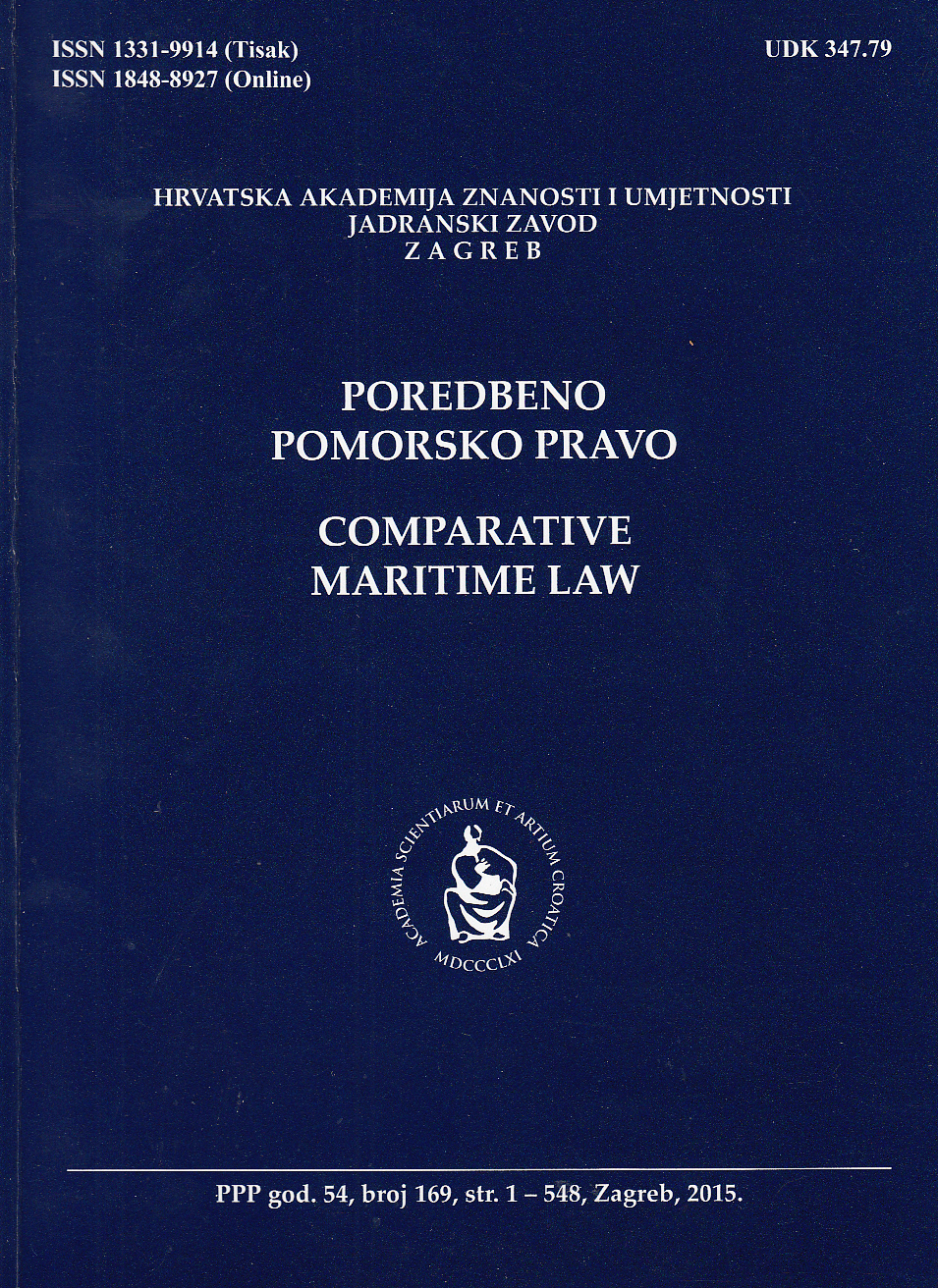
Keywords: delimitation; demarcation; Republic of Croatia; borderlines of cadastre districts; uti possidetis principle; thalweg; provisional application of treaties;
The final demarcation of frontiers between the successor States of the former Socialist Federal Republic of Yugoslavia is a painstaking job faced with many obstacles. The present article deals in particular with external boundaries of Croatia. The demarcation of the entire frontier has so far been accomplished only in respect to the boundaries with Hungary and that in the application of the 1920 Trianon Peace Treaty, the party of which was the Kingdom of Serbs, Croats and Slovenes. In respect to land and maritime frontiers with Slovenia, after the written and oral procedures have been accomplished, the rendering of the arbitral award is expected in the near future. The negotiations with Serbia are in progress. The Treaty on Boundaries between Bosnia-Herzegovina and Croatia was signed in 1999 by the two Presidents, but it has never been ratified in Parliaments of the two contracting States. Since then, it has been provisionally applied without interruption for fifteen years. In 2002 Croatia and the former Federal Republic of Yugoslavia (Serbia and Montenegro) concluded a Protocol on the Interim Regime along the Southern Border, which Montenegro succeeded after it had proclaimed its independence in2006. This article deals especially with the provisional application of treaties in general and with the impact of unilateral acts of the termination of agreements on boundaries, boundary regimes and other territorial regimes, when their provisions provide for that option. The author stresses the importance of the freedom of navigation of merchant ships of all flags on the Danube River according to Article 1 of the 1948 Belgrade Danube Convention, and the right of natural and juridical persons to the peaceful enjoyment of their immovable properties that happen to be allocated on the other side of the frontier.
More...![Maritime agency service - concealed : [case review]](/api/image/getissuecoverimage?id=picture_2013_44278.jpg)
Keywords: case review; maritime agency service;
The maritime agent undertakes, for and on behalf of the principal, to perform services. If the maritime agent does not expressly declare that he is acting in the capacity of a maritime agent, it shall be deemed, in respect of the person in good faith, that the maritime agent is acting in his own name.
More...![Pomorsko osiguranje : Pravo i praksa [= Maritime Insurance: Law and Practice - with bases of Land and Air Transport Insurance ] (author: D.Pavić) (Split, 2012) : [book review]](/api/image/getissuecoverimage?id=picture_2012_44554.jpg)
Keywords: book review;
Review of: Drago Pavić, POMORSKO OSIGURANJE : PRAVO I PRAKSA s osnovama kopnenoga i zračnog transportnog osiguranja., Split, 2012., 562 str., Književni krug
More...![Demand guarantee or suretyship : [case review]](/api/image/getissuecoverimage?id=picture_2011_44581.jpg)
Keywords: case review;guarantee;suretyship;shipbuilding contract;
The claimant has issued three guarantees to the buyers of three new buildings at the Korean shipyard for refund of the advance payments of the contract price. The shipyard failed to deliver the vessels pursuant to terms of the shipbuilding contracts and the defendants demanded payments under the guarantees. The claimant sought a declaratory judgement realizing him from the guarantees, arguing that the guarantees are classic contracts of suretyship and not performance bonds or demand guarantees. The judge concluded that they were performance bonds i.e. demand guarantees and decided in favour of the defendants in the amounts of the guarantees.
More...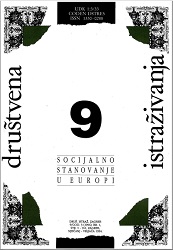
Keywords: Social housing; Slovenia; Marginal institution;
The institution of social housing is analyzed in the framework of transitional processes. Firstly, the question is raised about the nature of the phenomenon and some evidence presented to show that the direct state involvement as well as its targeting to marginal social groups are not the inherent attributes of social housing as such. After highlighting the models of social housing and their features under socialism, the current transformation is described. lt is argued that the alleviation of the old models of social housing was much more successful than the implementation of new models. The first process, subject to privatisation, presented a major public concern, while the latter is quite the opposite: implementation of new models of social housing has not yet entered the public agenda and is treated as a domain of the state administration.
More...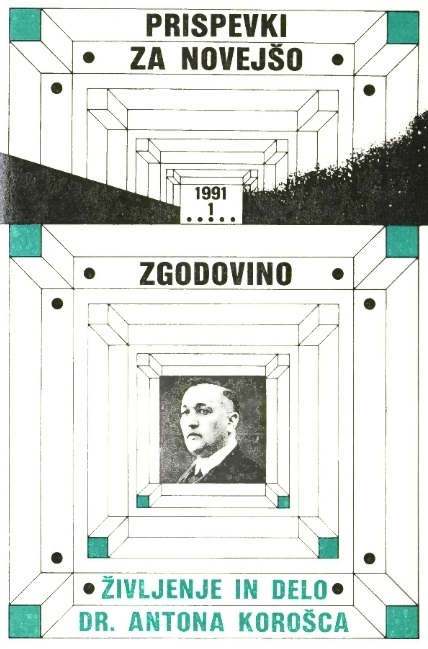
Keywords: Dr. Anton Korošec; 1918-1940; political history; political activity; politician; Serbian political parties; Yugoslav conflict;
On the basis of newspaper and journal articles as well as memoirs the author illustrates the attitude of Serbia's political parties and eminent personalities towards Dr. Anton Korošec and his political activity in Belgrade. An important politician of a national format, Dr. Korošec was active within a new political setting that he had been able to adjust to very well. He sought support from the king and the radical circles, while ne supported the Serbian side in the fundamental Yugoslav conflict between the Serbs and the Croats, even though he himself had advocated the concept of autonomy that the official Serbian political parties had severely criticized.
More...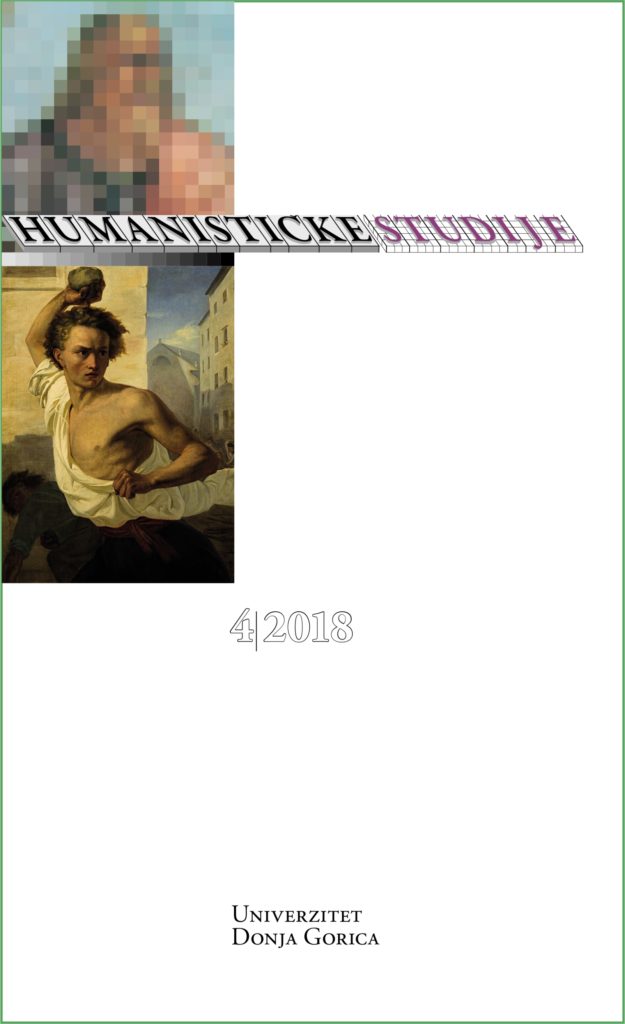
Keywords: Europe; liberalism; statehood; democracy; revolution
The paper reflects the political idea of Europe and four political narratives: liberal narrative (human rights and constitutionalism); statehood; democracy and revolution. Based on leading narratives of political and constitutional theory (Habermas, Brunhost, Greem, Nagel, Diaz, Mauss) the author defends a normative demand for establishing narratives on political Europe.
More...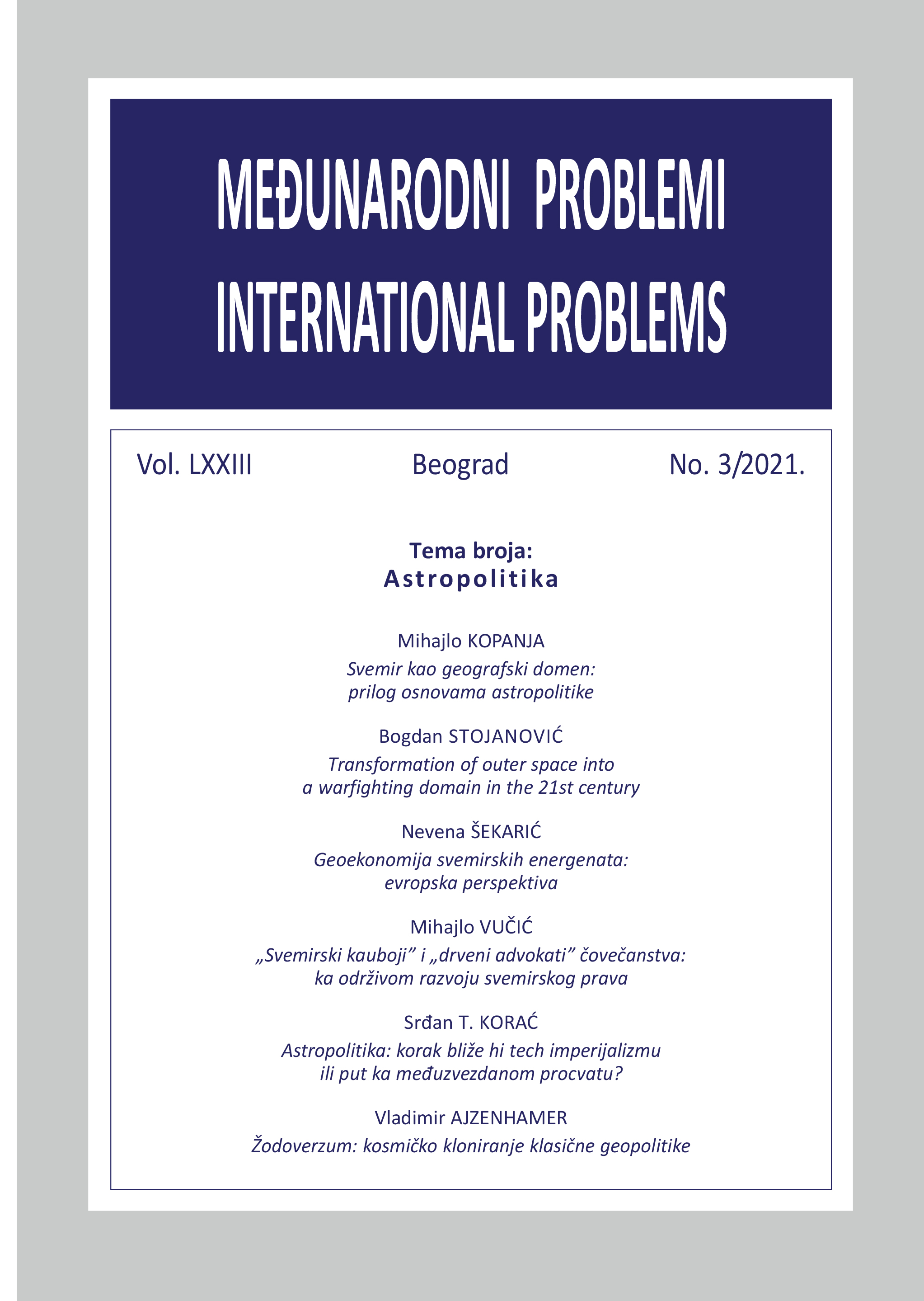
Keywords: outer space; commercialization; international law; freedom of enterprise; common heritage of mankind; non-appropriation; sovereignty
The commercialization of outer space has created new challenges for international law, aside from the traditional issues of demarcation and militarization. International norms that regulate space activities were adopted at a time when one could not imagine a private company being able to economically exploit space resources. The doctrine is divided between the supporters and opponents of the interpretation that allows for freedom of enterprise and ownership over space resources. The majority of states are prone to accept freedom of enterprise, limited by the interests of mankind and environmental protection. At the same time, except for states that allow for such a possibility through their internal laws, states are against ownership rights, believing that the non-appropriation principle is absolute. Economic exploitation is in accordance with the object and purpose of the Outer Space Treaty since it can undoubtedly benefit mankind. Ownership rights, however, are impossible to conceive under the existing legal framework. There is a need to reform the legal framework, if possible, through amendments to the Outer Space Treaty, although the more realistic avenue is through informal standards that would prevent the chaos of freedom to exploit outer space. The sustainable development of outer-space commercialization would, in the author’s opinion, encourage an internationally regulated economic initiative, which would not exclude freedom of access to space resources for every state.
More...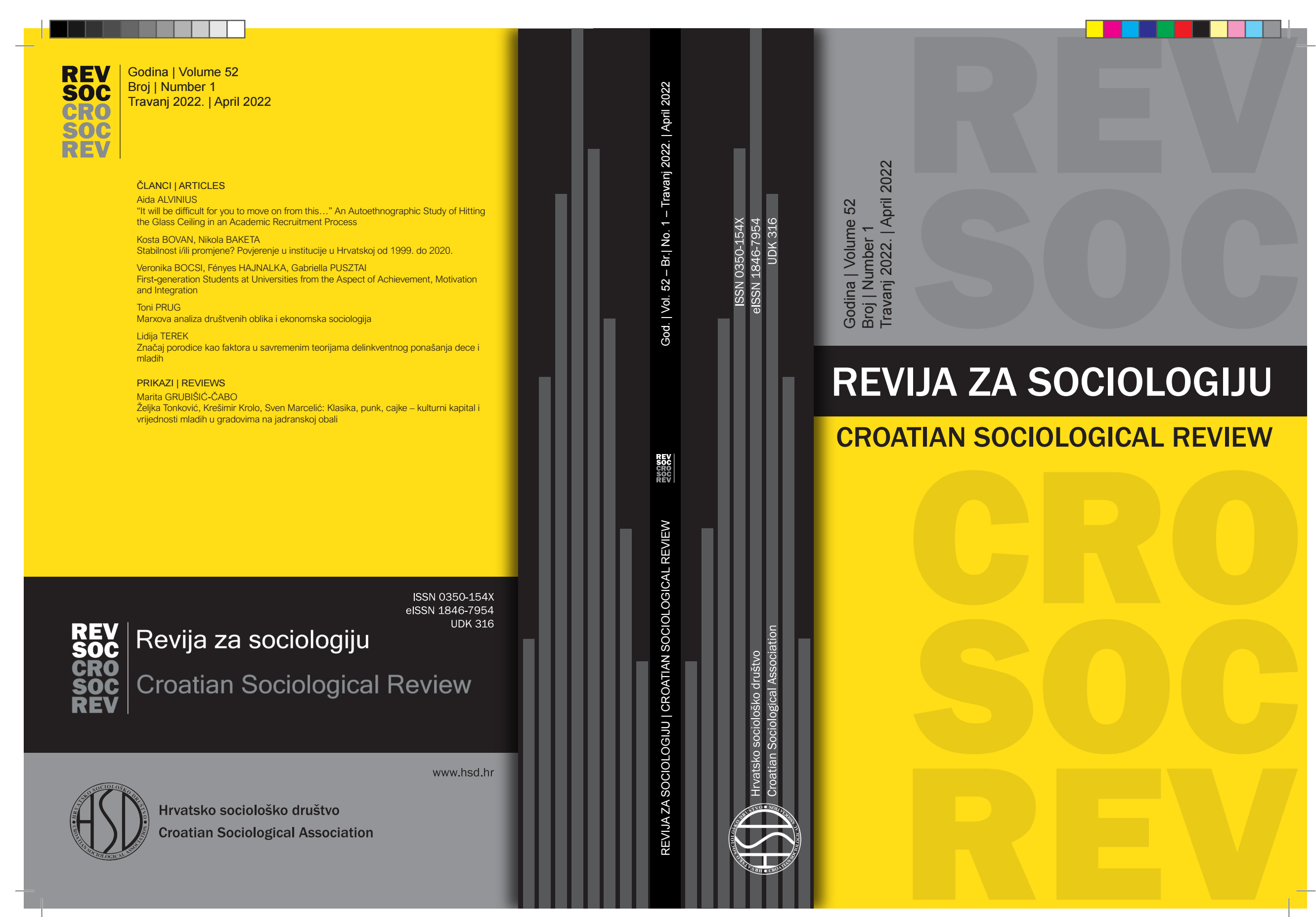
Keywords: social forms; economic sociology; New Reading of Marx; political economy;
This article deals with the New Reading of Marx, an interpretation focused on the analysis of social and value forms and associated social relations. Marx’s analysis of social forms makes it possible to distinguish determinate abstractions (commodity and capital in the capitalist mode of production) from general ones (product, money), denaturalizing the economic vision of production, opening up a way for possible understanding of different modes of production and their social character. The article argues that the analysis of social forms opens up a path for re-approaching the field of enquiry that conventionally belongs to economics, whose abandonment marks sociology for most of its history, with the sociological analysis, thus rendering visible social dimensions of the object of investigation, whilst questioning and disputing the monopoly of economic theories and categories. The connection between Marx’s analysis of social forms and the work of other classical sociologists is demonstrated, opening up the discussion of its relevance for economic sociology. Reviewing the new economic sociology, the article shows how its Weberian roots drastically narrow the space for integration of Marx’s work. It is argued that the reading of Marx presented here can however be situated in a more broadly understood contemporary economic sociology that includes a wider range of approaches retaining the multi-paradigmatic character of sociology. In conclusion, the article discusses the relationship between domestic sociology and Marxism, arguing that sociological literature can be enriched by re-evaluating Marxism through the prism of the New Reading of Marx.
More...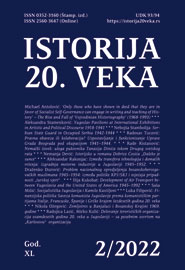
Keywords: Yugoslavia; Camillo Castiglioni; United States; Italy; Export-Import Bank; Loan; Litigation; Unsettled Claims
After the breakup of relations with the Soviet Union and its satellites in 1948, Yugoslavia began to turn to Western countries, seeking not only formal but also informal ties for connecting with them, especially in the economic field. Italian financier Camillo Castiglioni seemed like a good choice for the role of unofficial mediator, especially because of the contacts he had with US financial circles. During 1949, the Yugoslavs hired him as an informal mediator for negotiations with the Export-Import Bank of the United States, in order to obtain a loan from this banking institution. An agreement was signed with him, in which he was promised an adequate reward for mediation. Since at the same time the official representatives of Yugoslavia and the United States were involved in the loan negotiations, and because of the indignation of the Americans over Castiglioni’s role, Belgrade quickly gave up his services. For his engagement, Castiglioni received compensation from Yugoslavia in the form of money and goods (hemp), which referred only to the costs of mediation, but did not include the promised commission. Taking advantage of the fact that he could not get the promised amount of money from the sale of hemp, Castiglioni initiated a lawsuit against Yugoslavia in an Italian court in 1951 and demanded that he be paid the difference in money, and also the amount of the promised commission. Although the court ruled in his favor that same year, Yugoslavia did not recognize the court’s decision. The next few years passed on the one hand in Castiglioni’s efforts to execute the court verdict and collect the claims, and on the other hand in the attempts of state officials in Belgrade and Rome to find a compromise solution that would satisfy the Yugoslavs. This included offers for a settlement, proposals for arbitration of an international court, and the like. The trial and the execution of the verdict took place at a time when Italy and Yugoslavia were trying to unravel the complicated knot of Trieste, so the Castiglioni case was also influenced by the situation in bilateral relations. Finally, in 1955, Castiglioni managed to collect the requested amount, which was paid off by the Italian state as a part of a broader Yugoslav-Italian agreement on war reparations.
More...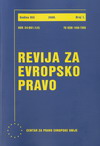
Keywords: vertical agreements; exclusive distribution; selective distribution; distribution contracts; EU (competition) law
Distribution of goods and services is very important in the developed trading system of modern world. Direct connection between the producers and the consumers is very rare in business practice, especially when international relations are concerned. It is usual in contemporary practice that, between the sealer and the buyer, appear more business subjects; these business subjects made a special distributive channel (connecting producers with consumers). Distribution of goods can be done in many different manners, no matter of the fact which of these forms is concerned, legal instrument for realisation of distribution are contracts. These contracts, used to provide distribution of goods and supply of consumers, have very important role in modern trade law. According to the type of agreement concerned many different distribution contracts exist in practice (exclusive distribution, exclusive purchasing, selective distribution, agency, and franchising). Distribution agreements (and their legal forms - contracts), generally contain same clauses which are not compatible with competition rules; the exclusivity clauses are the best example for these non-compatibility. It is very important to harmonise these contract stipulations with the competition law provision. This article analyses the specialities of distribution contracts, their types, essence, contents, their legal nature and, especially, the position and place of these agreements in European Union (competition) law. The place, importance and the permissibility of these agreements are regulated by the provisions of competition law; first of all by the rules of articles 101, (and 102) of UFEU, and the rules made by the Commision and Counsel of EU. The very significant role in legal regime of the distribution arrangements belongs to the Court of Justice too. The decisions made by Court of Justice, in certain determined cases (precedents), were created special law standards which become the patterns for resolving certain important dilemmas.
More...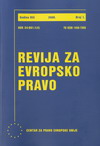
Keywords: copyright; IP; WIPO; EU; Bern Convention; computer programmes
The World Intellectual Property Organization (WIPO) is a specialized agency of the United Nations. It is dedicated to developing a balanced and accessible international intellectual property (IP) system, which rewards creativity, stimulates innovation and contributes to economic development while safeguarding the public interest. WIPO Copyright Treaty is concluded in 1996 in Geneva. The most important goal of the Treaty is protection of the rights of authors in their literary and artistic works. It has a special relation to the Berne Convention. The most important innovations of the Treaty are scope of protection of computer programs and compilations of data (databases). Emphasizing the need to maintain a balance between the rights of authors and the larger public interest WIPO Copyright Treaty gives the outstanding significance of copyright protection as an incentive for literary and artistic creation.
More...